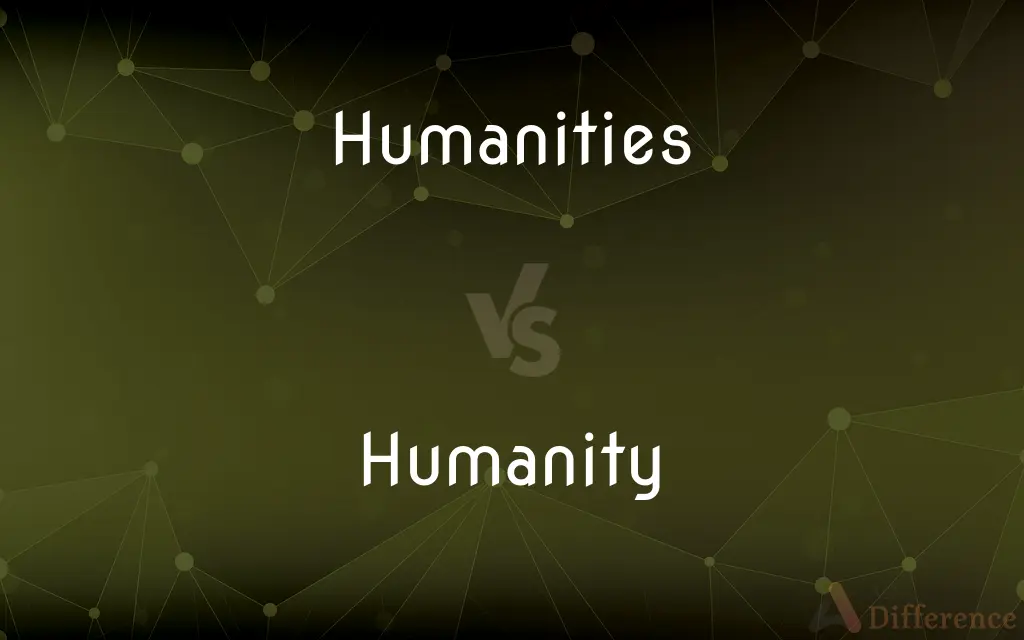Humanities vs. Humanity — What's the Difference?
Edited by Tayyaba Rehman — By Fiza Rafique — Updated on March 2, 2024
Humanities are academic disciplines studying human culture, such as literature, philosophy, and history, whereas humanity refers to the collective human species or qualities of compassion and kindness.

Difference Between Humanities and Humanity
Table of Contents
ADVERTISEMENT
Key Differences
Humanities encompass a range of academic fields dedicated to the study of human culture, including literature, philosophy, art history, and languages. These disciplines explore human experiences, values, and expressions throughout history. On the other hand, humanity can refer to the human race collectively, emphasizing the biological and social aspects of human beings as a species.
While the humanities focus on intellectual exploration and critical analysis of human creations and thought, humanity is often invoked in discussions about ethical behavior, empathy, and the moral obligations humans have towards each other. Humanities scholars might analyze texts or artifacts to understand cultural norms, whereas discussions about humanity often revolve around fostering compassion and addressing global challenges.
Humanities disciplines often employ qualitative methodologies, engaging with theories and concepts to interpret cultural and artistic expressions. In contrast, reflections on humanity might lead to actions and initiatives aimed at humanitarian aid, social justice, and improving human welfare, grounded in an understanding of shared human qualities and vulnerabilities.
The study of humanities can contribute to a deeper understanding of what it means to be human, exploring diverse perspectives and the complexity of human societies and cultures. Meanwhile, the concept of humanity underscores the importance of kindness, empathy, and solidarity in navigating the challenges and triumphs of the human experience.
Humanities education encourages critical thinking, creativity, and empathy, equipping students with the skills to analyze and appreciate the richness of human culture. Conversely, promoting humanity involves advocating for ethical principles and actions that support human dignity, rights, and well-being, reflecting a commitment to the collective good of society.
ADVERTISEMENT
Comparison Chart
Definition
Academic disciplines studying human culture and expression
The collective human species or qualities of kindness
Focus
Culture, history, art, and philosophy
Compassion, empathy, and the human condition
Methodology
Qualitative analysis of texts and artifacts
Ethical reflection and action towards human welfare
Key Objectives
Understanding human experiences and cultural expressions
Promoting kindness, empathy, and social justice
Practical Applications
Education, research, cultural preservation
Humanitarian aid, ethical initiatives, social reforms
Compare with Definitions
Humanities
Humanities research often involves critical theory and philosophical inquiry.
A philosophy seminar might debate the ethics of artificial intelligence.
Humanity
Humanity underscores the importance of solidarity in facing global challenges.
International cooperation in pandemics is a testament to the strength of humanity.
Humanities
Humanities study human culture and history through disciplines like literature and philosophy.
Studying Shakespeare's plays in a humanities course explores human nature and societal norms.
Humanity
Humanity is characterized by qualities of compassion and empathy.
Volunteers in disaster relief efforts showcase the best of humanity.
Humanities
Humanities education emphasizes critical thinking and creativity.
Humanities students often critique literary works to understand diverse perspectives.
Humanity
Promoting humanity involves actions that support human dignity and rights.
Humanitarian organizations work globally to protect vulnerable populations.
Humanities
Humanities scholars contribute to cultural preservation and understanding.
Historians documenting oral histories help preserve cultural narratives.
Humanity
Discussions about humanity often address ethical and moral obligations.
Debates on climate change consider humanity's responsibility to the planet.
Humanities
Humanities disciplines analyze artistic expressions and cultural artifacts.
Art history classes dissect the significance of Renaissance art in reflecting societal values.
Humanity
Humanity refers to the collective human species, focusing on shared experiences.
Advances in technology and medicine are milestones in humanity's progress.
Humanities
Humanities are academic disciplines that study aspects of human society and culture. In the Renaissance, the term contrasted with divinity and referred to what is now called classics, the main area of secular study in universities at the time.
Humanity
Humans considered as a group; the human race.
Humanities
Humans considered as a group; the human race.
Humanity
The quality of being humane; benevolence.
Humanities
The condition or quality of being human.
Humanity
A humane characteristic, attribute, or act.
Humanities
The quality of being humane; benevolence.
Humanity
The human condition or nature.
Humanities
A humane characteristic, attribute, or act.
Humanity
The quality of being human;
He feared the speedy decline of all manhood
Humanities
The study of language, literature, the arts, history, and philosophy, sometimes including religion.
Common Curiosities
What are the main disciplines within the humanities?
Literature, philosophy, history, art history, and languages are core humanities disciplines.
What does humanity mean in the context of ethics?
It refers to qualities of kindness, empathy, and moral obligations towards others.
How are humanities and humanity interconnected?
Humanities study human culture and expressions, enriching our understanding of humanity's complexities and shared qualities.
Can studying the humanities improve one's understanding of humanity?
Yes, by exploring diverse cultural expressions and historical contexts, one can gain deeper insights into human nature and values.
Are humanities subjects considered practical?
Yes, they develop critical and analytical skills applicable in various fields, including education, communication, and cultural management.
What is the significance of cultural artifacts in humanities studies?
They provide insights into historical periods, societal values, and human creativity.
How does humanity influence social policies?
Ethical considerations about human dignity and rights can shape policies aimed at social justice and welfare.
How do humanitarian efforts relate to the concept of humanity?
They are practical expressions of humanity's core values, aiming to alleviate suffering and improve living conditions.
How do the humanities contribute to society?
They foster critical thinking, cultural understanding, and appreciation for diversity and human creativity.
What role does humanity play in global challenges?
It emphasizes the need for compassion, solidarity, and ethical action in addressing issues like poverty, injustice, and climate change.
Can humanities education influence one's ethical beliefs?
Yes, by exposing students to diverse perspectives and ethical dilemmas, it encourages reflective thinking about values and morality.
What distinguishes humanities from natural sciences?
Humanities focus on cultural, artistic, and philosophical aspects of human life, using qualitative analysis, whereas natural sciences study the physical and biological world through empirical methods.
How can individuals contribute to humanity?
By engaging in compassionate actions, advocating for justice, and supporting initiatives that promote human welfare.
Why is empathy considered a crucial aspect of humanity?
It fosters understanding and compassion, essential for addressing human suffering and building inclusive communities.
What impact has digital technology had on humanities research?
Digital tools have expanded the scope of humanities research, facilitating the analysis of large datasets and enhancing access to cultural artifacts.
Share Your Discovery

Previous Comparison
Wrap vs. Wind
Next Comparison
Screen vs. MonitorAuthor Spotlight
Written by
Fiza RafiqueFiza Rafique is a skilled content writer at AskDifference.com, where she meticulously refines and enhances written pieces. Drawing from her vast editorial expertise, Fiza ensures clarity, accuracy, and precision in every article. Passionate about language, she continually seeks to elevate the quality of content for readers worldwide.
Edited by
Tayyaba RehmanTayyaba Rehman is a distinguished writer, currently serving as a primary contributor to askdifference.com. As a researcher in semantics and etymology, Tayyaba's passion for the complexity of languages and their distinctions has found a perfect home on the platform. Tayyaba delves into the intricacies of language, distinguishing between commonly confused words and phrases, thereby providing clarity for readers worldwide.
















































